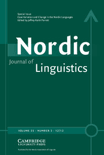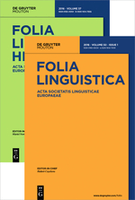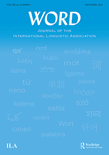
Annual Review of Linguistics
Scope & Guideline
Connecting Scholars Through Comprehensive Reviews
Introduction
Aims and Scopes
- Linguistic Theory and Analysis:
The journal emphasizes theoretical frameworks in linguistics, covering a wide range of topics from syntax and semantics to phonetics and phonology. It seeks to advance understanding of language structure and function. - Psycholinguistics and Cognitive Linguistics:
There is a significant focus on the intersection of linguistics and cognitive science, exploring how language is processed and acquired, including studies on bilingualism, language disorders, and cognitive models. - Sociolinguistics and Language Variation:
The journal addresses the social aspects of language, including language variation across different communities, the impact of sociocultural factors on language use, and issues of linguistic inclusion and diversity. - Computational Linguistics and Technology:
With the rise of technology, the journal includes research on computational models and their application in understanding language, reflecting the growing importance of data-driven approaches in linguistic research. - Language Documentation and Preservation:
The journal highlights efforts in documenting endangered languages and exploring linguistic typology, emphasizing the importance of preserving linguistic diversity in a globalized world.
Trending and Emerging
- Interdisciplinary Approaches:
Recent publications show an increasing integration of linguistics with fields such as psychology, cognitive science, and technology, highlighting the importance of interdisciplinary research in understanding language. - Language and Social Justice:
There is a growing focus on issues of linguistic inclusion, diversity, and social justice, reflecting a broader societal awareness of the role language plays in equity and representation. - Technological Impact on Linguistics:
Emerging themes related to computational linguistics and the impact of technology on language processing and documentation are becoming more prominent, showcasing the relevance of digital tools in linguistic research. - Language in Context:
An increasing emphasis on the contextual factors influencing language use, including discourse analysis and the role of social media, indicates a trend towards understanding language within its real-world applications.
Declining or Waning
- Traditional Syntax and Morphology:
There seems to be a declining emphasis on traditional syntactic and morphological studies, which may be overshadowed by more interdisciplinary approaches that integrate cognitive and computational perspectives. - Historical Linguistics:
The focus on historical linguistics appears to have waned, with fewer papers addressing diachronic analyses and language change, possibly due to a greater emphasis on contemporary language issues. - Language Acquisition Theories:
While still relevant, specific frameworks of language acquisition, particularly those that do not incorporate modern cognitive or technological insights, have seen a reduced presence, as newer models gain traction. - Phonological Theory:
Research specifically centered on phonological theory without interdisciplinary connections is less frequently published, indicating a trend towards integrating phonological studies with cognitive and sociolinguistic perspectives.
Similar Journals

Catalan Journal of Linguistics
Advancing Understanding in Language Studies.Catalan Journal of Linguistics is a distinguished academic publication dedicated to the dynamic field of linguistics and language studies. Published by the Universitat Autònoma de Barcelona, this open-access journal has been disseminating impactful research since 2002, making significant contributions to the understanding of linguistic theory, language acquisition, and sociolinguistics, particularly within the Catalan language context. With a robust engagement in the scholarly community, it proudly holds a Q2 ranking in Linguistics and Language as of 2023, reflecting its commitment to high standards of research and innovation. The journal is accessible to a global audience, promoting the free exchange of knowledge beyond geographical boundaries, and serves as an essential platform for researchers, professionals, and students aiming to stay at the forefront of linguistic inquiry. With its rich archive of articles, the Catalan Journal of Linguistics stands as a vital resource for anyone keen to explore contemporary linguistic issues and advancements.

Nordic Journal of Linguistics
Pioneering insights into the evolution of language.Nordic Journal of Linguistics, published by Cambridge University Press, serves as a prominent platform for the dissemination of cutting-edge research in the field of linguistics. Established in 1978 and spanning over four decades, the journal has curated a rich repository of scholarly work that reflects the dynamic and evolving nature of language studies. With an impressive Q2 ranking in both the Linguistics and Language category and a commendable performance in Scopus rankings, placing it at the 74th percentile among Arts and Humanities, the journal is recognized for its high academic standards and impact on contemporary linguistic research. Scholars and practitioners can access a variety of studies that delve into different languages, linguistic theories, and methodologies, fostering broader understanding and dialogue within the linguistic community. Although the journal does not currently offer open-access options, it remains an invaluable resource for researchers, professionals, and students keen on advancing their knowledge of language and linguistics.

RUSSIAN LINGUISTICS
Unlocking the complexities of Russian linguistics.RUSSIAN LINGUISTICS is a peer-reviewed academic journal published by Springer, dedicated to advancing the understanding of the Russian language and its interplay with various linguistic frameworks. With a longstanding history that spans from its inception in 1974, the journal encompasses a broad range of topics within the fields of linguistics and language studies, offering valuable insights especially in *Developmental and Educational Psychology* and the intricacies of linguistics at large. Currently ranked in the Q2 quartile for Linguistics and Language, and holding substantial positions within Scopus rankings, RUSSIAN LINGUISTICS serves as an essential resource for researchers, educators, and students alike, fostering dialogue and collaboration within the international linguistic community. The journal notably provides critical access to research findings that enhance the comprehension of Russian linguistics' role in a global context, despite operating under a traditional access model. For those pursuing scholarly excellence, RUSSIAN LINGUISTICS remains a pivotal platform for disseminating innovative research and promoting the study of language.

Glottometrics
Unveiling Language Patterns with Quantitative PrecisionGlottometrics is an esteemed academic journal dedicated to the intersection of linguistics and quantitative methods, published by the International Quantitative Linguistics Association (IQLA). Based in Germany, this journal serves as a vital platform for researchers and professionals in the fields of linguistics and applied mathematics, fostering the exploration of quantitative approaches to language studies. With its impact factor reflecting its commitment to high-quality research, Glottometrics has established a robust presence in the academic community, as denoted by its categorization in the Q2 quartile in Linguistics and Language and Q4 in Applied Mathematics. While the journal operates on a subscription-based model, it has made significant strides in the ranking hierarchy, securing positions in the 44th to 48th percentiles across various relevant categories in Scopus. Spanning the years 2017 to 2024, Glottometrics invites contributions that harness innovative quantitative methodologies for linguistics research, making it an essential resource for students, researchers, and professionals engaged in the dynamic analysis of language.

Languages
Exploring the rich tapestry of language and its applications.Languages, published by MDPI, is a prestigious open-access journal dedicated to the field of Linguistics and Language studies. Since its inception in 2016, this journal has rapidly established itself as a leading platform for high-quality research, achieving an impressive Q1 ranking in 2023 and standing out in both the Arts and Humanities as well as the Social Sciences categories with significant percentile rankings (76th and 74th respectively). Based in Switzerland, Languages fosters an international community of scholars who are committed to exploring the multifaceted dimensions of language, from theoretical frameworks to practical applications. With a robust e-ISSN of 2226-471X, the journal prioritizes accessibility, allowing researchers, professionals, and students to freely engage with cutting-edge research and insights. By bridging the gap between theory and practice, Languages plays a crucial role in advancing our understanding of linguistic phenomena, making it an invaluable resource for anyone invested in the study of language.

FOLIA LINGUISTICA
Innovating Insights in Linguistics and LanguageFOLIA LINGUISTICA, published by WALTER DE GRUYTER GMBH, is a premier scholarly journal dedicated to the field of linguistics. Established in 1967, the journal has consistently provided a platform for innovative research and scholarly discourse in language and linguistics, contributing significantly to the academic community's understanding of language structures, usage, and cognitive processes. With its classification in the top quartile (Q1) of linguistics and language in 2023, FOLIA LINGUISTICA holds a respectable rank (#282/1088) within the Arts and Humanities category and an admirable percentile rank of 74th, ensuring its position at the forefront of linguistic scholarship. Researchers and academics from around the globe can access a wealth of knowledge and cutting-edge research findings through this esteemed publication, which is vital for anyone looking to engage with the latest advancements in linguistics. Located in Berlin, Germany, FOLIA LINGUISTICA encompasses all aspects of language research, making it an indispensable resource for researchers, professionals, and students alike seeking to deepen their understanding of language and its complexities.

Forma y Funcion
Fostering dialogue and discovery in language studies.Forma y Funcion is a distinguished open access journal published by UNIV NACIONAL COLOMBIA, FAC CIENCIAS HUMANAS, dedicated to advancing the fields of linguistics and language studies. With an ISSN of 0120-338X and an E-ISSN of 2256-5469, the journal has been committed to open access since 2005, ensuring that research is freely accessible to scholars, professionals, and students around the globe. Situated in Bogotá, Colombia, it has established itself as a pivotal platform within the academic community, achieving a commendable Q2 ranking in 2023 in the subfield of Linguistics and Language. Its Scopus rankings further underscore its relevance, placing it in the 55th percentile among peers in the Arts and Humanities and the 51st percentile within Social Sciences. Covering a range of topics related to language and linguistics, Forma y Funcion aims to foster cutting-edge research and dialogue, making significant contributions to the field from 2019 through 2024 and beyond.

NEUPHILOLOGISCHE MITTEILUNGEN
Unraveling Linguistic Trends from a European PerspectiveNEUPHILOLOGISCHE MITTEILUNGEN, published by the esteemed Modern Language Society, stands as a significant contribution to the domain of Language and Linguistics. With a history dating back to 1971, this journal has consistently provided an academic platform for researchers and scholars, navigating through the intricacies of philology and linguistic studies. Although it is indexed in Scopus with rankings reflecting its position in the Arts and Humanities and Social Sciences categories, it currently does not offer Open Access, which may require interested parties to seek institutional access for its wealth of content. The journal has experienced periods of coverage discontinuation in recent years, yet it remains a valued source for advancing the understanding of language theories and linguistic practices. Its location in Helsinki, Finland, offers a unique European perspective on global linguistic issues. The journal is ideal for those looking to engage with evolving linguistic trends and contribute to contemporary discussions in the field.

Concentric-Studies in Linguistics
Exploring the depths of language and society.Concentric-Studies in Linguistics is a distinguished journal published by the National Taiwan Normal University, College of International Studies & Social Sciences. With an ISSN of 1810-7478 and an E-ISSN of 2589-5230, this journal contributes significantly to the field of linguistics, encompassing a wide range of topics from language acquisition to sociolinguistics. As of 2023, it holds a respectable Q3 ranking in both the Linguistics and Language categories, and it is positioned in the 28th and 24th percentiles within its Scopus ranks for the Arts and Humanities and Social Sciences, respectively. Although it operates under a traditional access model, its publication from 2014 to 2024 reflects a commitment to advancing academic discourse. Researchers, professionals, and students are encouraged to engage with its rich content as it provides a platform for innovative studies and critical analyses that push the boundaries of linguistic research.

WORD-JOURNAL OF THE INTERNATIONAL LINGUISTIC ASSOCIATION
Fostering impactful discussions in the realm of linguistics.WORD-JOURNAL OF THE INTERNATIONAL LINGUISTIC ASSOCIATION is a leading peer-reviewed journal dedicated to advancing the field of linguistics and language studies. Published by Routledge Journals, Taylor & Francis Ltd, this esteemed journal has earned a reputation for its rigorous scholarship, reflected in its 2023 Q2 ranking in Linguistics and Language and its solid performance in Scopus Ranks. Encompassing a wide range of topics—from theoretical frameworks to empirical research—WORD serves as an essential resource for linguistics researchers, educators, and students alike. While currently not operating under an open access model, the journal is committed to providing high-quality, impactful research articles that contribute significantly to the linguistic community. With its convergence periods from 1998 to 2009 and 2015 to 2024, WORD continuously fosters the discourse of language studies, ensuring that critical insights and discussions are accessible for ongoing academic exploration.